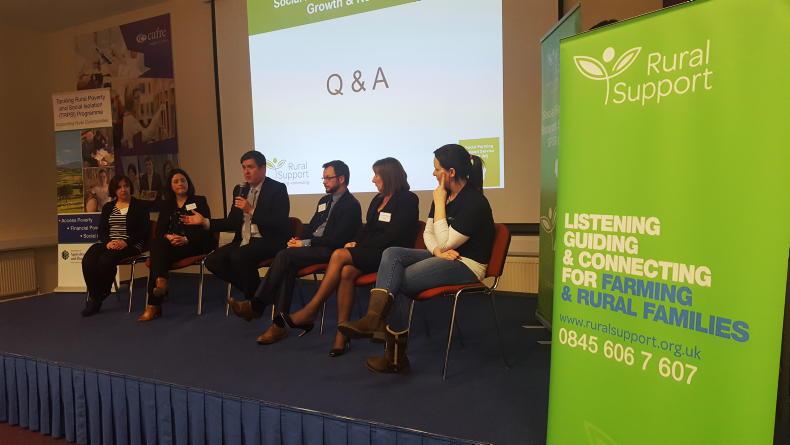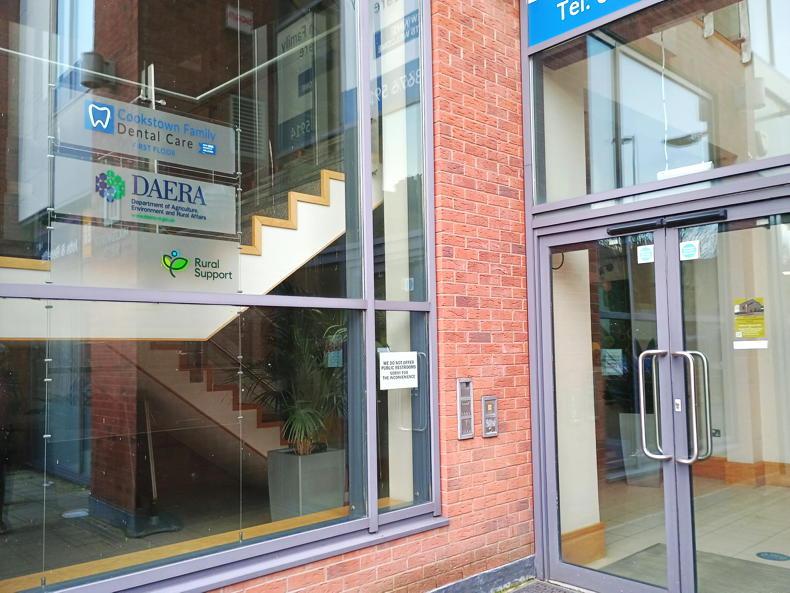It’s safe to say that the Trócaire box is a staple in many Irish homes during Lent. Founded in 1973, Trócaire operates in 16 countries providing aid to communities suffering from poverty and injustice. This year marks the 50th anniversary of the charity, and the focus for this year’s Lenten Appeal is Somalia.
Somalia is suffering from its worst drought in 40 years. Over 1.4 million people have been forced to leave their homes and an estimated three million livestock have perished. Irish Country Living spoke to Noreen Gumbo, Head of Humanitarian Programmes at Trócaire, who has spent time in Somalia and has seen first-hand the impact of drought.
The situation
Noreen explains that while Somalia is prone to droughts, this one is particularly bad as five rainy seasons have now failed.
“Waterpoints, rivers and wells have all dried up, which has meant that a huge number of people have had to leave their homes, their villages and move to what we call displacement camps that are generally situated on the edges of towns,” she says.
Trócaire runs health centres in the Gedo district of Somalia. “We meet people as they come through our health facilities, often bringing children who are malnourished,” she says. “Often women present with pregnancy-related issues and it’s to do with compromised immune systems that result from hunger. It’s a pretty desperate situation and worse than has been seen for many years.”
Children under five are at the highest risk of malnutrition. Children arriving to the health centres are given sachets of specialised food made from peanuts and milk powder to help them regain weight, while in severe cases they are admitted and require further specialised product and medical care. “When they are discharged then we try to provide the family with a food basket to enable them to look after the child and the other children in the family. That’s the support we provide,” says Noreen.
Trócaire also supplies water to displacement camps, through sending in trucks of water for families to collect or by deepening wells. They also provide food baskets to more vulnerable people.
Displacement
Most families who have been forced to leave their homes have been internally displaced in Somalia. There is widespread hunger across the country, and regions are colour-coded on the map depending on the severity of the situation. Noreen explains that people from the red zones, where the situation is at its worst, will move to areas not as badly affected to find assistance.
This year’s Trócaire box tells the story of a Somali family. Ambiyo, her husband Mahat and their eight children are among hundreds of thousands of families across Somalia who have been forced to leave their homes.
“What we try to do is represent a family unit, so we’re not just talking about numbers because the numbers are just hard to comprehend,” says Noreen. “But they represent families in Somalia who are suffering from issues related to lack of food.”
Factors
Food availability is a difficult issue in Somalia and in other countries where Trócaire operate. There are two main factors to this: climate change and conflict.
“Some of that is related to climate change and some the increasing impact of drought events or flooding events where crops are destroyed,” explains Noreen. ?
“Some of it is related to conflict. So we know now [that] due to the conflict in Ukraine, less food is being exported. Somalia is reliant on wheat from Ukraine. Somalia also has conflict ongoing.
“If you look at climate, the people in Somalia have done very little to impact climate change. Their emissions are very low, but their country has been really badly affected by climate change events. Similarly, conflict is often influenced by global politics, and people in villages are suffering the impact of conflict but again, with very little role in the actual conflict itself.”
Agriculture
Noreen explains that Trócaire has a strand that focuses on agriculture. Somalia has a mixture of crop production and pastoralism, whereby people move their livestock each year in search of grazing ground. This practice is being threatened by climate change.
“In a community where they’re dependent on livestock, we work with them to try and ensure they are keeping the animals in good health, moving the animals to the right pasture ground at the right time and if there is a drought, working to reduce the herd if drought hits because otherwise you lose the animal,” says Noreen. “That’s a really hard one, because people resist until the last minute having to sell their livestock. It’s more than their livelihood, it’s their wealth, it’s their culture, it’s where they’ve come from, but it is what’s required.”
50th anniversary
“It’s a very special year for Trócaire marking ?50 years of work. We have been able to utilise support from the Irish public in so many situations,” says Noreen. “I suppose the campaign of the 50th is to keep these issues alive for people in Ireland.
“Also to recognise the really generous support that people in Ireland provide. I think we know that, we’re very grateful for it and it does enable us to continue doing the work we do and there are many positive stories of people assisted, that the funds have supported.”
More info
To find out more about the Lenten Appeal or make a donation visit www.trocaire.org.
Read more
Good Causes: your Guide to Charity Events happening around the country
Meet the family who filled 500 shoeboxes for the Christmas gift appeal
It’s safe to say that the Trócaire box is a staple in many Irish homes during Lent. Founded in 1973, Trócaire operates in 16 countries providing aid to communities suffering from poverty and injustice. This year marks the 50th anniversary of the charity, and the focus for this year’s Lenten Appeal is Somalia.
Somalia is suffering from its worst drought in 40 years. Over 1.4 million people have been forced to leave their homes and an estimated three million livestock have perished. Irish Country Living spoke to Noreen Gumbo, Head of Humanitarian Programmes at Trócaire, who has spent time in Somalia and has seen first-hand the impact of drought.
The situation
Noreen explains that while Somalia is prone to droughts, this one is particularly bad as five rainy seasons have now failed.
“Waterpoints, rivers and wells have all dried up, which has meant that a huge number of people have had to leave their homes, their villages and move to what we call displacement camps that are generally situated on the edges of towns,” she says.
Trócaire runs health centres in the Gedo district of Somalia. “We meet people as they come through our health facilities, often bringing children who are malnourished,” she says. “Often women present with pregnancy-related issues and it’s to do with compromised immune systems that result from hunger. It’s a pretty desperate situation and worse than has been seen for many years.”
Children under five are at the highest risk of malnutrition. Children arriving to the health centres are given sachets of specialised food made from peanuts and milk powder to help them regain weight, while in severe cases they are admitted and require further specialised product and medical care. “When they are discharged then we try to provide the family with a food basket to enable them to look after the child and the other children in the family. That’s the support we provide,” says Noreen.
Trócaire also supplies water to displacement camps, through sending in trucks of water for families to collect or by deepening wells. They also provide food baskets to more vulnerable people.
Displacement
Most families who have been forced to leave their homes have been internally displaced in Somalia. There is widespread hunger across the country, and regions are colour-coded on the map depending on the severity of the situation. Noreen explains that people from the red zones, where the situation is at its worst, will move to areas not as badly affected to find assistance.
This year’s Trócaire box tells the story of a Somali family. Ambiyo, her husband Mahat and their eight children are among hundreds of thousands of families across Somalia who have been forced to leave their homes.
“What we try to do is represent a family unit, so we’re not just talking about numbers because the numbers are just hard to comprehend,” says Noreen. “But they represent families in Somalia who are suffering from issues related to lack of food.”
Factors
Food availability is a difficult issue in Somalia and in other countries where Trócaire operate. There are two main factors to this: climate change and conflict.
“Some of that is related to climate change and some the increasing impact of drought events or flooding events where crops are destroyed,” explains Noreen. ?
“Some of it is related to conflict. So we know now [that] due to the conflict in Ukraine, less food is being exported. Somalia is reliant on wheat from Ukraine. Somalia also has conflict ongoing.
“If you look at climate, the people in Somalia have done very little to impact climate change. Their emissions are very low, but their country has been really badly affected by climate change events. Similarly, conflict is often influenced by global politics, and people in villages are suffering the impact of conflict but again, with very little role in the actual conflict itself.”
Agriculture
Noreen explains that Trócaire has a strand that focuses on agriculture. Somalia has a mixture of crop production and pastoralism, whereby people move their livestock each year in search of grazing ground. This practice is being threatened by climate change.
“In a community where they’re dependent on livestock, we work with them to try and ensure they are keeping the animals in good health, moving the animals to the right pasture ground at the right time and if there is a drought, working to reduce the herd if drought hits because otherwise you lose the animal,” says Noreen. “That’s a really hard one, because people resist until the last minute having to sell their livestock. It’s more than their livelihood, it’s their wealth, it’s their culture, it’s where they’ve come from, but it is what’s required.”
50th anniversary
“It’s a very special year for Trócaire marking ?50 years of work. We have been able to utilise support from the Irish public in so many situations,” says Noreen. “I suppose the campaign of the 50th is to keep these issues alive for people in Ireland.
“Also to recognise the really generous support that people in Ireland provide. I think we know that, we’re very grateful for it and it does enable us to continue doing the work we do and there are many positive stories of people assisted, that the funds have supported.”
More info
To find out more about the Lenten Appeal or make a donation visit www.trocaire.org.
Read more
Good Causes: your Guide to Charity Events happening around the country
Meet the family who filled 500 shoeboxes for the Christmas gift appeal









SHARING OPTIONS